Presenting the "Seven-Execution Memorial" that shook the Tran Dynasty
In the history of the nation, not many scholars dared to put integrity above their own security like Chu Van An. The event of him submitting the Seven-Execution Memorial during the Tran Du Tong period showed the convergence of conscience, education and sense of responsibility of intellectuals.
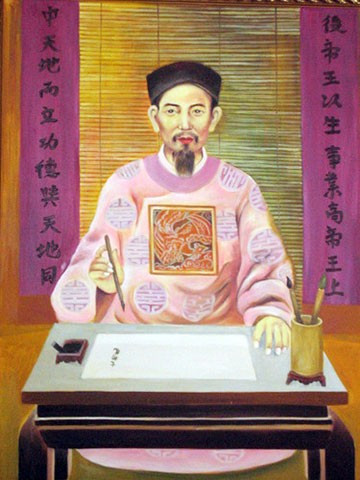
According to historical documents, during the reigns of King Tran Minh Tong and King Tran Hien Tong, the country was in a period of peace and political stability. After King Hien Tong had been on the throne for 12 years, he died (1329–1341). His younger brother Tran Hao succeeded him, namely King Tran Du Tong.
During the early days of Du Tong's reign, the government was still relatively stable; but after the death of the retired Emperor Tran Minh Tong (1357), the country's situation began to show signs of decline. In the court, corrupt officials were rampant, forming cliques; King Tran Du Tong neglected state affairs. Brief History of Vietnam recorded that the king "spent all day drinking, partying, building palaces, digging lakes, building mountains, and then letting rich people into the palace to gamble."
Faced with that situation, Chu Van An, at that time a mandarin in the court, repeatedly offered words of remonstrance. Not only did he speak, he also courageously wrote the Seven-Execution Memorial, requesting the execution of seven corrupt officials who were disrupting the court. The presentation of this memorial became a shocking event in the Tran Dynasty, because at that time only high-ranking officials often acted as remonstrants. However, the Seven-Execution Memorial was not accepted by King Du Tong. Chu Van An immediately resigned from office, left the court, and went to live in seclusion in Phuong Hoang Mountain (Chi Linh, Hai Duong ), taking the name Tieu An.
Chu Van An's submission of the Seven-Execution Memorial shocked public opinion because according to the regulations at that time, only the Censor-in-Chief had the right to admonish the king. This action showed Chu Van An's upright and upright qualities, that is, as an official, one must dare to say the right thing, must contribute to correcting the court, and must act for the people. A small but dedicated and honorable official is more valuable than one who holds a high position but does nothing beneficial for the country.
The exemplary Principal of the Imperial Academy
Chu Van An was born in 1292 in Quang Liet commune, Thanh Dam district (now Thanh Liet village, Thanh Tri district, Hanoi). He was a teacher, a doctor and a high-ranking mandarin under the Tran dynasty. According to Dai Viet Su Ky Toan Thu, he was steadfast and straightforward, always kept himself pure and did not seek personal gain. Throughout his life, he spent a lot of time reading books, was well-educated and had a great reputation. His students "filled the door, often passing the highest exams", reflecting his prestige and pedagogical talent.
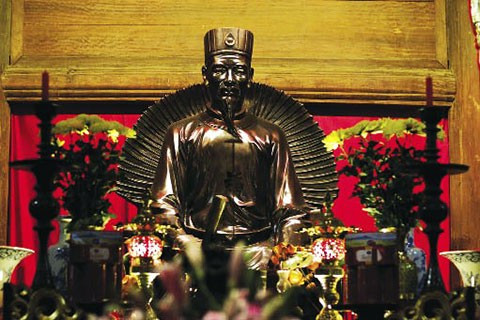
According to the Dictionary of Vietnamese Historical Figures, Chu Van An was a good but strict teacher who respected capable students and hated those who relied on their wealth and indulged in idleness. Among his students, many became famous mandarins and contributed to the country, typically Pham Su Manh and Le Quat, both high-ranking officials under the Tran Dynasty. During his lifetime, he was honored by the people as "Van the su bieu", meaning the eternal standard teacher of the Vietnamese people.
During Chu Van An's time, there were very few schools. Quoc Tu Giam in the capital was the only public school, initially reserved for the king's and mandarin's children, and later expanded to include talented people in the people. In addition, there were private schools such as Tu Thien Duong and Toat Trai Duong in Thien Truong ( Nam Dinh ) for the children of the Tran royal family, or Yen Tu (Quang Ninh) and Huong Son (old Ha Tay) schools serving only the monks and pagodas. Faced with this situation, Chu Van An opened private schools, teaching widely to the people, contributing to popularizing education and training the personalities of many generations.
Because there were too few schools and most of the people's children could not study, Chu Van An opened Huynh Cung school in his hometown (now Thanh Liet, Thanh Tri, Hanoi). Author Tran Le Sang wrote in the book Chu Van An, Nguyen Binh Khiem, Nguyen Thiep - three masters of Vietnamese education: "The school had classrooms, a library... The number of students studying at Huynh Cung school was quite large, up to 3,000 students."
During his time teaching at Huynh Cung, Chu Van An specialized in imparting Confucian classics. His highest goal was to “teach respect, teach loyalty, and teach culture”, meaning to teach students respect, loyalty, and elegance. Students at Huynh Cung were deeply influenced by his thoughts and style.
Chu Van An believed that people are born good and equal in their ability to receive education. Thanks to the teachings of family, society and school, intelligence and personality are formed and differentiated. Therefore, everyone has the right to study, and schools must be open to everyone. Teachers must help students develop their strengths, avoid bad things, and strive for good things to improve themselves. In teaching, he emphasized taking students as the center; when imparting knowledge, it must be appropriate to each person's abilities and characteristics, encouraging independent thinking, initiative and creativity of students.
In the 1314 examination, two of his students passed the Thai Hoc Sinh exam, equivalent to a doctorate, creating a great reputation among the scholars of the time. Thanks to that, the reputation of Chu Van An and Huynh Cung School spread throughout the country. Huynh Cung School became an important milestone in the history of Vietnamese education development, contributing to paving the way for the formation and development of private schools, creating conditions for a large number of people's children to study.
After the reputation of Chu Van An and Huynh Cung school spread, he was invited by King Tran Minh Tong to be the Rector of the Imperial Academy, overseeing education for the whole country.
The exemplary teacher of all time
According to Dai Viet Su Ky Toan Thu, after submitting the That Tram So petition but receiving no response from the king, Chu Van An left the capital for Chi Linh (Hai Duong), opened a school and continued his education career. Although this land was still remote and isolated at that time, many students still came to him. Here, he took the name Tieu An, devoted himself to teaching every day, writing poetry and maintaining a pure life.
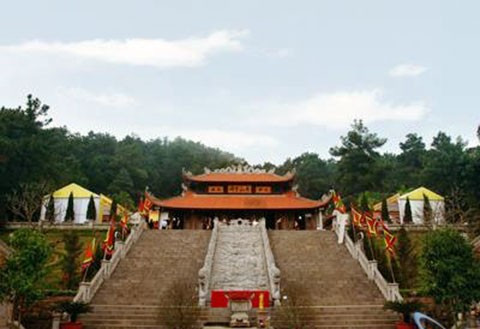
The appearance of Chu Van An sparked a learning movement in Chi Linh. Many people here became talented people, the most prominent being Mrs. Nguyen Thi Due - the only female doctor of feudal Vietnam, who passed the exam under the Mac Dynasty. Besides, there was also Nguyen Phong, who passed the Huong Cong exam at the age of 14 with his father, and passed the doctorate exam at the age of 26.
During his years teaching in the Chi Linh mountains, Chu Van An also grew medicinal plants, researched medicine, and treated people. His former students, even though they were officials far away, often returned to visit their teacher. Dai Viet Su Ky recorded that whenever they did something improper, he would still strictly instruct them, making people respect him even more.
At the end of his life, Chu Van An lived a simple but peaceful life, surrounded by study and literature. The court invited him many times to return to help the country, but he refused, keeping the integrity of a scholar. However, his heart still belonged to the Tran Dynasty. When King Tran Nghe Tong quelled the Duong Nhat Le rebellion and restored the throne, Chu Van An, despite his old age, still went to the court to offer his congratulations - a gesture that made the people and scholars of the time even more appreciative.
Returning to Chi Linh, at the age of nearly 80, he fell seriously ill and passed away in November 1370. He was honored by King Tran as "Van the su bieu" (Exemplary teacher of all generations) and had his statue placed in the Temple of Literature, the same place where Confucius was worshiped, a worthy recognition for the exemplary teacher of all generations.
In 2019, Chu Van An was honored by UNESCO as a world cultural celebrity. To date, he is one of six Vietnamese talents honored by UNESCO.
Source: https://khoahocdoisong.vn/chu-van-an-va-su-dung-cam-dang-that-tram-so-chong-lai-gian-than-post2149069543.html





![[Photo] General Secretary To Lam and National Assembly Chairman Tran Thanh Man attend the 80th Anniversary of the Traditional Day of the Vietnamese Inspection Sector](https://vphoto.vietnam.vn/thumb/1200x675/vietnam/resource/IMAGE/2025/11/17/1763356362984_a2-bnd-7940-3561-jpg.webp)








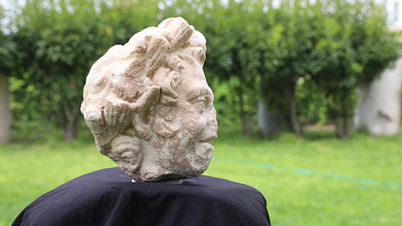









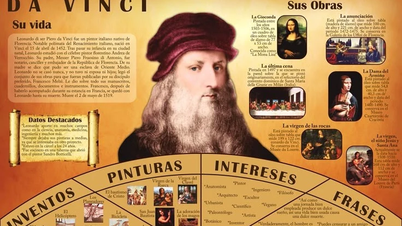










































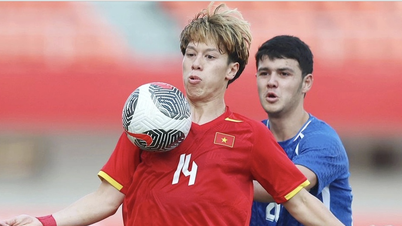

















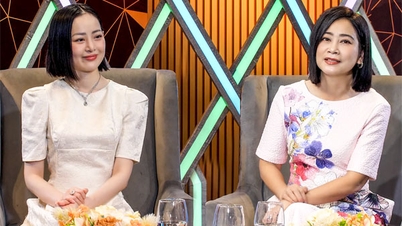

















Comment (0)